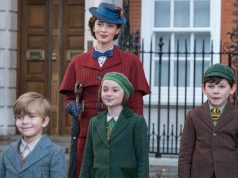First of all, I doubt the “greatest game ever played” was a game of golf. I would assume it was baseball, though football or basketball wouldn’t surprise me. Maybe even tennis. But golf? I don’t think so. It may have been the greatest GOLF game ever played, sure. But no way was it the greatest game of any kind. I’m just sayin’.
“The Greatest Game Ever Played” is not the greatest movie ever played, either. It focuses on the 1913 U.S. Open, where a 20-year-old amateur named Francis Ouimet went head-to-head with professional golf legend Harry Vardon. Did the underdog win? Well, the movie posters show Francis being held aloft in what appears to be victory, and once you’re about halfway into the film you realize there’s no other possible outcome. It’s not one of those “Rocky” things, where all he wants to do is go the distance. In this case, if he loses, the movie has no point.
So the pleasure, if any, will be in the journey, and this journey, adapted by Mark Frost from his own book and directed by actor Bill Paxton, is as by-the-numbers as a game of golf. There’s a par for every hole, and Paxton pretty much hits exactly that — sometimes over and sometimes under, but always close, with no surprises.
Francis (Shia LaBeouf) is the son of a French ditch-digger, and I mean that literally, not as a slur. Dad (Elias Koteas) is unsupportive of Francis’ desire to play golf, dismissing such endeavors as frivolous wastes of time, but Mom (Marnie McPhail) is more encouraging. He works as a caddy at the country club in their hometown of Brookline, Mass., but there is a vast gulf between caddies and players, insofar as players are the refined gentlemen of the world, while caddies are butt-scratching buffoons.
Francis runs into this attitude constantly. Approximately every five seconds, someone in the movie looks at Francis with an imperious eye and says, “A caddy playing golf? Why, my dear boy, such things aren’t done! I shan’t allow it!,” or some such. But he is selected for the U.S. Open anyway, thanks to the kindness of a few of his elders.
Of course, if there’s anyone snootier than wealthy New Englanders, it’s wealthy Old Englanders, and over in Britain things are indeed the same. A country club there is sending Harry Vardon (Stephen Dillane) and the rough-and-tumble Ted Ray (Stephen Marcus) to the U.S. Open with the intent that England should hold all the world’s major sporting trophies, including this one for golf. Vardon grew up a poor boy on the Isle of Jersey, where his home was razed and replaced with a golf course. To this day, he is haunted by the specter of the four wealthy, cadaverous men in stove-pipe hats who told him, “Golf is a gentleman’s game. It’s not for the likes of YOU!” Sometimes these figures appear in his mind when he is trying to putt, and it distracts him.
So Vardon and Francis are kindred spirits of a sort, but the rest of the English observing the U.S. Open are snobs, harrumphing all the time, being appalled at the low behavior of the Americans, and saying things like, “Well, I never!” and “I say!” while they peer through their monocles. The British are disdainful of all non-professional golfers, amateurs (pronounced “ama-toors,” of course) being somehow distasteful to them. Well, Francis is gonna show them, isn’t he!
Paxton’s directorial debut, 2002’s “Frailty,” had its flaws but was inarguably thought-provoking, even disturbing. “The Greatest Game Ever Played,” almost by design, is the exact opposite of thought-provoking and disturbing. It is thought-diminishing and comfortable. Shia LaBeouf, formerly of the Disney Channel and now emerging as a reliable film actor (see “Holes” and his amusing turn in “Constantine”), certainly draws a viewer’s attention with his gentle, disarming persona, but there is nothing else about the movie that warrants notice. The earnest-sounding musical score, the plucky urchin who acts as Francis’ caddy, the basic Rich vs. Poor, rise-to-the-top story line — it’s the same here as at all the other courses. You hit the ball, you walk to the next hole, you hit it again.
C (1 hr., 55 min.; )





